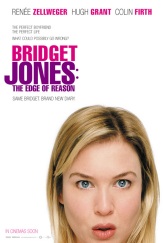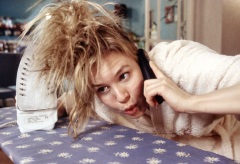|
Bridget Jones: The Edge of Reason |
| |
 |
UK/France/Ireland/USA, 2004. Rated R. 108 minutes.
Cast: Renée Zellweger, Colin Firth, Hugh Grant, Jim Broadbent, Gemma Jones, Jacinda Barrett, Celia Imrie, Shirley Henderson
Writers: Andrew Davies, Helen Fielding, Richard Curtis, and Adam Brooks, based on the novel by Helen Fielding
Music: Harry Gregson-Williams
Cinematography: Adrian Biddle
Producers: Tim Bevan, Jonathan Cavendish, Eric Fellner
Director: Beeban Kidron
LINKS
|
 n 2001, Bridget Jones's Diary and its slightly eccentric, slightly overweight heroine (Renée Zellweger) charmed audiences with her sharp wit and charming foibles as she negotiated dilemmas in life and love. The film, and Helen Fielding's novel on which it was based, loosely retold Jane Austen's Pride and Prejudice. Austen's influence helped lend the story cohesion and narrative drive, linking its comic episodes together and pushing the audience to an emotionally satisfying conclusion, when Bridget finally got the right man. The casting of Colin Firth as that man, who also played Austen's counterpart in the popular 1995 miniseries, was an inside joke that acknowledged Fielding's debt.
n 2001, Bridget Jones's Diary and its slightly eccentric, slightly overweight heroine (Renée Zellweger) charmed audiences with her sharp wit and charming foibles as she negotiated dilemmas in life and love. The film, and Helen Fielding's novel on which it was based, loosely retold Jane Austen's Pride and Prejudice. Austen's influence helped lend the story cohesion and narrative drive, linking its comic episodes together and pushing the audience to an emotionally satisfying conclusion, when Bridget finally got the right man. The casting of Colin Firth as that man, who also played Austen's counterpart in the popular 1995 miniseries, was an inside joke that acknowledged Fielding's debt.
Problem is, Jane Austen never wrote a Pride and Prejudice 2.
If she had, I doubt very much that Elizabeth Bennett would have turned on Mr. Darcy, reconsidered the virtues of Mr. Wickham, and landed herself in jail.
The story of Bridget Jones: The Edge of Reason goes something like this: Bridget Jones madly loves Mark Darcy (Firth). And publicly embarrasses herself. Bridget doubts Mark's love for her. And publicly embarrasses herself. Bridget goes back and forth whether to break up with Mark. And publicly embarrasses herself. Bridget feels threatened by Mark's hot young assistant Rebecca (Jacinda Barrett). And publicly embarrasses herself. Bridget does break up with Mark. And publicly embarrasses herself. Bridget winds up in Thailand on a journalistic assignment with her ex-lover, the despised Daniel Cleaver (Hugh Grant). And publicly embarrasses herself. Etcetera.

Bridget Jones (Renée Zellweger) has a wacky hair-ironing episode in Bridget Jones: The Edge of Reason. |
The unimaginative Bridget Jones: The Edge of Reason feels like sliced up leftover turkey from the first movie, stuffed between slices of flimsy Wonderbread. This movie is 100% recycled. As helmed by recycled materials expert Beeban Kidron (To Wong Foo, Thanks for Everything! Julie Newmar), The Edge of Reason rehashes every funny moment from the original movie in strained episode after strained episode after strained episode. There's no narrative anymore; there's just incidents. Instead of laughing with Bridget, The Edge of Reason—as the unfortunate title implies—laughs at her. It forgets that the charm of the first film derived from slight exaggeration of recognizable human idiosyncrasies. Her imperfections are no longer recognizable, and therefore no longer endearing, because they have been exaggerated to the point that Bridget becomes irredeemably ridiculous.
Because the story is so repetitive and poorly structured, the film lacks conflict or suspense. Bridget and Mark take too long to split up, and once the separation is accomplished, Daniel is so transparent that he never makes a believable romantic alternative. To find some kind of tension, the film has to resort to throwing our heroine in a Thai prison as a result of a series of events that you've seen in only a few hundred other films and television shows. Grant does discover slightly new ground by deciding to see how far he can take the sleazebucket thing. Though borne of the same impulse to exaggerate that cripples the rest of the film, the result is pretty funny.
Most unforgivably, Bridget Jones seems to have lost her voice. The first movie was about her perspective, and it was understood that all the embarrassment she experiences was as much about her perception of those incidents as the incidents themselves. She had a spine, too—a core of determination and self-respect (despite all her self-deprecation) that saw her through the worst of circumstances. Here, Bridget is just along for a bumpy ride. Fortunately Zellweger is always an engaging performer, which helps redeem the character somewhat. Thanks to her, and Grant's occasional mugging, The Edge of Reason is passably entertaining, but that's the most you can say for it.
Sequels are always difficult, because they must offer something different while remaining true to the characters and artistic perspective of the original. Comedy sequels are particularly difficult, because much of comedy derives from newness and unexpectedness. You can't make an unexpected film that simply repeats the jokes of the original. Instead of resorting to exaggeration, The Edge of Reason could have explored how Bridget adapts to, say, sharing her home with a man, and the compromises a relationship requires. Apparently the novel does delve into these issues, but the film isn't about Bridget learning to cope with the difficulties of a long-term relationship. It's just about Bridget learning to accept that, yes, Mark does love her. Though after seeing this film, it's anyone's guess why.
Review
© November 2004 by AboutFilm.Com and the author.
Images © 2004 Universal Pictures. All Rights Reserved.


